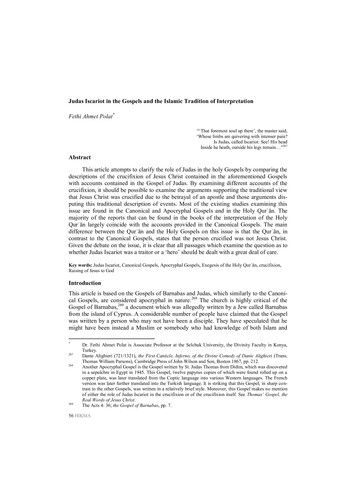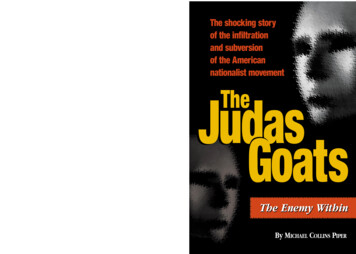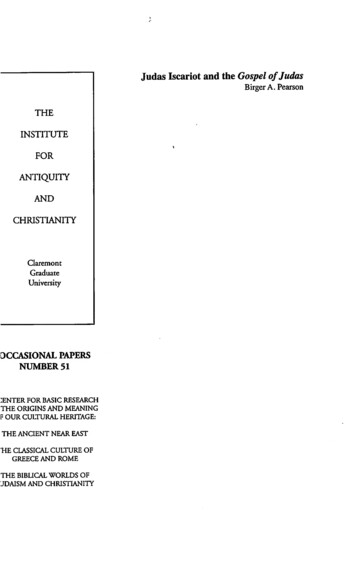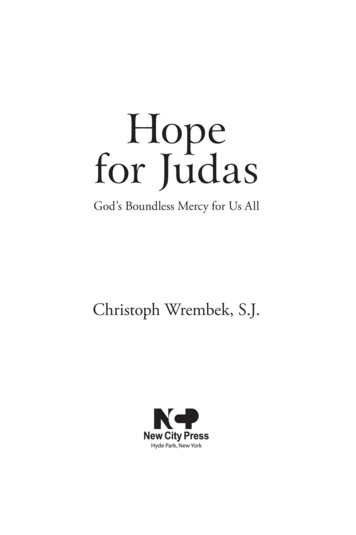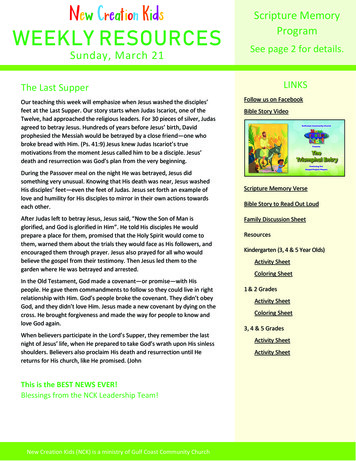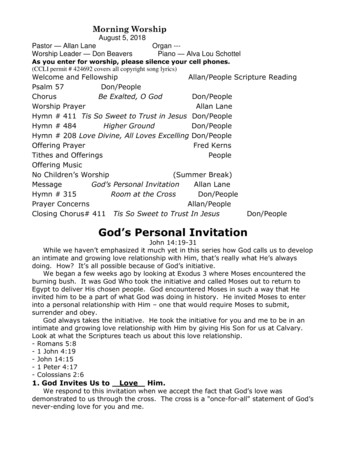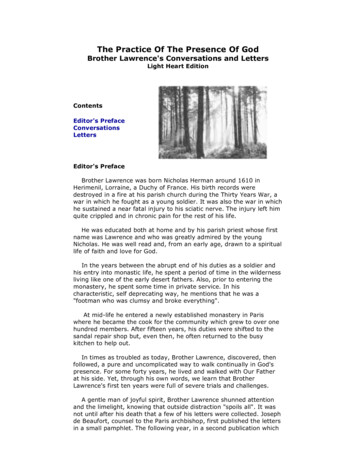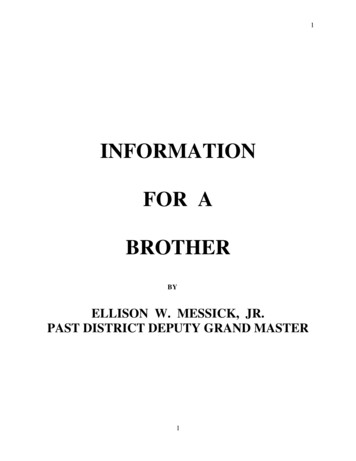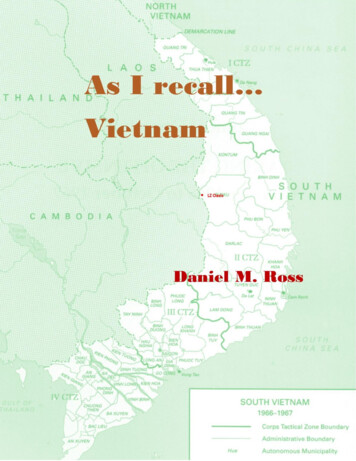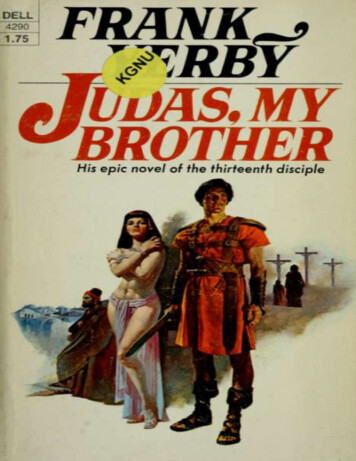
Transcription
The following four quotations, two ancient, two modern, have been included only to serveas fair warning to the prospective reader. The author humbly beseeches anyone who isemotionally* dependent upon myth, legend, dogma, and creedal preconceptions, to closethis novel quietly but firmly at this point. He also asks that no bookseller accept a buyer'smoney for Judas, My Brother, without having previously allowed him to read this page."Primus in orbe deus fecit timor."Petronius"Tantum religio potuit suadere malorum."Lucretius"My final reflection, I'm afraid, was that if hypocrisy can be said to be the homage vicepays to virtue, theology could be said to be a homage nonsense tries to pay to sense."James Gould Cozzens"I believe that man must learn to live without those consolations called religious, whichhis own intelligence must by now have told him belong to the childhood of race. . . . Manhas only his own two feet to stand on, his human trinity to see him through: Reason,Courage, and Grace. And the first plus the second equals the third."Don Wanderhope* That anyone could be intellectually dependent upon them is, the writer confesses,beyond his capacity for credulity.—F.G.Y.A Word to the ReaderThis novel is a demythologized account of the beginnings of Christianity; and, therefore, Iam sadly aware, sure to be labeled controversial. Actually, there is nothing controversialabout it. The vast majority of scholars, especially those counting themselves among theProtestant branches of Christianity, have known for centuries that the origins of theChristian religion must have been very like the processes depicted in this book. Today, asthe rumbles from Holland show, even enlightened Catholics are beginning to reexaminethe issues, to free themselves from the mindcrushing weight of churchly dogma.The research for this novel has occupied me for fully thirty years. It has twice taken me toItaly, Greece, Egypt, Jordan, and Israel. I have visited every place herein described,including the ruins of the caves where the Dead Sea Scrolls were found, and those of theEssene Monastery at Khirbet Qumran. I have walked through the wilderness of Judea,passed over roads where, two hours before my arrival, Jordanian mines blew to bits a jeepcarrying four Israeli soldiers; I have come under the muzzles of the guns pointing down
from Mount Sinai, and across the Mandel-baum Gate, when the Israeli retaliatory raid onthe Jordanian town of Samu, on November 13th, 1966 almost caused a preliminary to theJune 1967 Arab/Israeli War. I mention this not to boast (I was as frightened as anynormal human being would be under those circumstances) but to remind the reader thatthis work was written at considerable cost, and to ask him to take it as seriously as it isintended.This novel touches upon only two issues which, in a certain sense, might be calledcontroversial: Whether any man truly has the right to believe fanciful and childishnonsense; and whether any organization has the right to impose, by almost imperial fiat,belief in things that simply are not so. To me, irrationality is dangerous; perhaps the mostdangerous force stalking through the world today.This novel, then, is one man's plea for an ecumenicism broad enough to includereasonable men; and his effort to defend his modest intellect from intolerable insult.Beyond that, I hope that you. Reader, will find it also the rattling good tale I intended it tobe; for, if you can put down, whatever the value of its dialectics, I have failed thenovelist's primary task.Frank G. Yerby Madrid, Spain September 2nd, 1967Judas, My BrotherPrologueI "The Author to Theophilos:* Many writers have undertaken to draw up an account ofthe events that have happened among us, following the traditions handed down to us bythe original eyewitnesses and servants of the Gospel, And so I, in my turn, yourExcellency, as one who has gone over the whole course of these events in detail, havedecided to write a coimected narrative for you, so as to give you authentic knowledgeabout the matters of which you have been informed."THE GOSPEL ACCORDING TO SAINT LUKE, CHAPTER 1, VERSES 1-4.n "Nathan bar Yehudah, to His Imaginary Excellency, Theophilos, Greetings! Or did youlive perhaps, after all, despite that solemn pseudonym that the Saintly Physician Loukasgave you? Theophilos, by interpretation, God Lover! There are not many men that namewould fit. . . . "Yet almost I persuade myself that I knew you once, God Lover. Was it inAthens, where we listened to Sophist and Singer, heard the hypokritoi chant immortallines, frequented flute girls and hetairai, drank deep of life, gamed our youth away? Orwas it at Lesbos beside the wine-dark sea? Or at Ephesos where— *" "I grow old. My mindwanders. Surely I only invented you, God Lover, as I've invented so many things: Newmyths for old, shining legends, grander lies—I know not, I do not know. . . .
* Theophilos (and not Theophilus, as most editions of the New Testament have it, sinceLoukas, a Greek-speaking Syrian, wrote in Greek, not in Latin) was almost surelyimaginary. The name i lf 6 a ;. God, plus tAo ?. Mend, lover, is suspect By using itLoukas, Saint Luke, clearly intended to let his readers know that his dedication was amere device whose real purpose was to explain to the general reader the author's subjectmatter."Still, the device is useful. I will copy the great fictioneer, mythmaker Loukas (Did he,himself, believe the fables that he wrote? Or did he merely intend that others shouldbelieve?) and call you Theophilos, Lover of God, imagine you a Christianos, address toyou this narrative written in your lovely, all but universal tongue. For herein, myimaginary friend, is truth unblemished, from one who witnessed your Lord lesous' life,who called him not Master, but friend. I have lived too long to permit lies or to writethem. I fear me it will distress you: To dreamers, Truth is an unlovely thing. . . ."But who loves Truth loves God. For God is Truth— or nothing. Therefore to you,Theophilos, God Lover, Imaginary Friend, I dedicate this: my life, my book. . . .Farewell, Nathan."y
Book IIn which I belatedly learn the history of my family, the mystery surrounding my birth, become a friend of a strange Galilean boy called Yeshu'a ha Notzri, and run away with aRonmn centurion's daughter.Chapter IMy Uncle Hezron's farm near Nazareth in Galilee is part of my childhood, in spite of thefact that I was born in Judea. You see, my uncle went up to Jerusalem to attend thewedding of his brother, Yehudah, to Eli-Sheba bath Boethus, a daughter of our greatestpriestly house. And the impression that my uncle, Hezron ben Mattathiah, made upon thetiny, birdlike aristocratic maiden who two years later became my mother, was so greatthat had it not been surrounded by the religious aspects of awe and reverence, it mighthave troubled my father's sleep.Anyhow, starting when I was eight years old, she sent me every blessed summer north toGalilee to bring me under the direct influence of so pious a man. Which, as I shall relate,had most disquieting consequences.On the day that my history begins—for life commences not with birth, but with theonslaught of awareness—I remember climbing for hours away from the flatlands of myuncle's estate, up among the hills that encompassed it round about, coming breathless atlast to the top of a slope, and sitting there lost and dreaming as the sun slanted across thecamel humps of the little hills to the westward, and turned the waters of the MareInternum, the Great Sea, burnished silver like a shield, so bright I had to turn my eyesfrom them and cool my smarting gaze upon the soft green Valley of Jezreel to the south,crowned and surrounded by stark naked mountains, among them Moreh where our greatGideon fought, and those of Gilboa, where mighty and piteous Shaul was slain. To theeast, I could see Mount Tabor, rounded, burnt brownish green with its scant forests;further east, in Transjordania, the mountains of Gilead, from which no balm ever came,jagged, tortured by the endless wind-driven scourings of desert sands; then south andwest, angling my gaze behind a cupped hand across the sight-murdering glare of sun. Icould see Mount Carmel falling wooded and green in long slopes to the Great Sea. A land,this, for prophets, fordreamers; for, peering northward through pale violet haze to where range after rangefollowed one another, jagged, saw-toothed—the mountains of Napthali, Harmon's whitefang gnawing blue heaven, and even, far off and unclear, the snow-glistened peaks ofLebanon—the critical, questioning mind lay dormant, the faculty for doubt was stilled.But I couldn't see the low-lying Sea of Galilee—which isn't really a sea at all, but only alake—from there. The Tetrarch Philip, who, of all Herod's sons, seemed most anxious toplease the Romans, going so far as to put the Imperator's image upon his coins (among us
Idolatry, and a terrible crime), called it Lake Tiberias. Despite him, in my childhood wecontinued to call it Lake Gennesareth, which is its Aramaic name. But, by whatever nameyou call it, surely it is the loveliest lake in all the world.Sitting there that fateful morning, gazing in the direction of the lake I couldn't see, thefeeling of being alive, of being aware, of perception, was in me so keenly that it hurt. Andwhat I was chiefly aware of were the contradictions with which my life was hedged about.Because, although I 'offered no resistance to being sent to Galilee, for, to tell the truth, Iloved to go, the fact remains that this alternation, this perpetual tearing loose of myexistence each time I felt myself firmly rooted to a known, familiar world, did me, I amsure, permanent harm.Of course, I could have survived, even mastered the aberration of being a man of twocountries, equally a son of the stony, sunbaked majesty of Judea, awash with hard clarityalways, perpetually athirst, so that the heat boils one's brains within one's skull—which iswhy my birthplace has always been so prodigal a producer of prophets and other madmen—and a child of lovely, lyrical Galilee, green and fragrant, whispering with waters,flowering with lilies, whose beauty so drowns the senses that (except, of course, for a fewprincely families like mine!) in all of memory nothing has ever come from there exceptthe amme ha aretz, those ignorant of the Law, dumb fishermen and peasants, speaking anAramaic that is an affliction to listen to, an offense to the ear.But being forced to divide my life between a devout, believing P'rushite and a worldly,doubting Zadokite was too great a burden for my childish mind to hear. For, bytugging at me now this way, now that, my father and my uncle split my mind, my soul,the verv" essence of my being, down the middle like a gutted fish.You see, I loved them both. And there were no two more different men in all the world.For my father, Yehudah ben Matthya (to give our name its Aramaic spelling), was bynature a skeptic and a doubter: while my Uncle Hezron liVed and breathed pure faith. So.in a way, they were born Sadducee and Pharisee: because, to oversimplify, the Sadduceesbelieve in almost nought but power, while the Pharisees have so fierce a faith that theyalmost lose sight of life and living: "Strain at a gnat and swallow a camel,'' which was whatYeshu'a said of them.With my father. I read the Greek philosophers, learned to worship reason, logic, daringlyto destroy all the premises upon which religious faith can be built. In my uncle's house. Ikept all the feasts with a devotion that filled my soul with reace. Of course, we kept themat home, too; but sOxT.e.h:r.g was missing. My father, it was true, performed the holyrites with consummate grace: but there was a twinkle of private, secret amusement in hiseye. His glance, meeting mine, seemed to say: "For form's sake, son: But you and I seethrough all this superstitious nonsense, don't we?" And my young mind leaped to agree.What were Rosh Hashanah. Yom Kippur, Bikkurim. Suk-kotK Shemini AtzerethJ
Hanukkah, Purim. P'sach, Lag Bi omer. Sha\uoth, Tishah B'ab, but the remnants of diesun-blasted mindless dreams of hawk-faced desen tribesmen, retreating into thesemirages of the soul because their lives were so intolerably hard? Yet. in my uncle's house,they were high. holy, splendid things! I put on the skullcap and the tallith. bound thetellifin to my head and arm, praved with utter devotion, total faith:"Shema Ysroel! Hear. O Israel! The Lord is God! The Lord is One!"But now. the need for certitude, for peace of mind, was in me like a blade. I stood up,muttering to myself: "I'll have it out with Uncle Hezron! I'll make him tell me! I've simplygot to know!''WTiat this muttered disjointed phrase of mine referred to, what it was I needed to know,was a strange thing indeed: How it was that alone of all the great families of Israel, minewas the only house divided against itself, thesole princely clan in which two brothers were members of our nation's most bitterlyopposed sects: The Zadokim, whom you call the Sadducees, and the P'rushim, byinterpretation, Pharisees.And if it seems odd to you that I had reached and passed Bar Mitzvah age withoutknowing anything of my family's history, you're right. It was odd. All my life, suchknowledge had been withheld from me. Each time I'd asked about my ancestors, abouthow our princely family had come into existence, how our house had split apart, I'd beenput off with: "Later, when you're older, Nathan—**Well, I was old enough now! The Bar Mitzvah ceremony, celebrated at age thirteen,admits a Jewish boy to manhood; and I was almost a year past mine. So my uncle couldn'tput me off any longer. I wouldn't let him. That we were the banim Matthya, the banimMattathiah, a princely house, I knew; I'd heard my uncle boast that we were the onlyfamily in all Galilee that was of pure, unmixed Jewish blood. That we were rich andrespected was evident: for my father to have been able to marry a daughter of the Houseof Boethus, which had held a monopoly on the high priesthood for more than a hundredyears, was proof of that. Why, theq, all the mystery? I'll have it out! I thought again; I'llknow!So thinking, I plunged down the slope toward my im-cle's house. By the time I'd reachedit, I was out of breath, so I stood there until I'd got my second wind. Then, because theBar Mitzvah ceremony had taught me neither the discretion nor the sense it wassupposed to, I bawled out like a yearling calf: "Uncle! Uncle! You've got to tell me why—"Then old Abigail, the oldest maidservant on the place, whose incurable habit ofscandalmongering and gossipping about other people's affairs had so tried my uncle'spatience that he had been threatening to put her off our place for years, came out of the
house and glared at me."Just what are you roaring about, young master?" she snapped. "Your uncle's gone out.Fact is, this morning before you were even up, he went down to Kafer Nahum to attend tosome business—though what kind it was he didn't say "I could hear the disappointment in her tone. The old witch dearly loved poking her longnose into things thatdidn't concern her. I half turned away, then I whirled back again to face her. She'd been inour family for forty years. Surely she'd know. And if she did, it was inconceivable that shecould resist telling me, especially if there was anything disreputable about my family'shistory, which, from the way my uncle and my father both had evaded recounting it, I wasbeginning to suspect there was."Abigail—" I said. "How'd my family come to live here? In. Galilee, I mean? And whatwere they, anyhow: P'rushim or Zadokim? And why's my father one sect, and my uncleanother? Tell me!""Why you mannish boy!" she said. "It's none of your business, and—and anyhow, you askRab Hezron. It's not my place to—""Abigail, please!" I wheedled.She looked craftily around her. No one was near."If you tell Rab Hezron that I—" she muttered."I won't tell him! I swear it by the Ineffable Name!'*That's the most awful oath any Jew can take. I could see it shocked her; but it alsoreassured her. And, anyhow, her delight in scandalmongering was too strong."All right," she said. "Sit here beside me, and I'll tell you. But if your uncle finds out I did,he'll put me off the place. . . .""He won't find out!" I said. "You've my word on that!""Well—" the old crone began, "your family didn't come here. They were always here—atleast the female side, anyhow. Your first ancestress was named Bernice. Bernice haYochanan. Her husband was the Rabbi Yochanan bar Eleazer of Kafer Tepha . . .""Where's that?" I said. "I thought I knew every village in Galilee, but I never heard ofTepha.""Of course not," Abigail said. "How could you? The Goyim burned it to the ground, with
the good Rab and his five brothers in it. Them and every other grown man in the kafer.Saved the boys and the women, though. Took 'em with them, the lecherous swine. Thegood-looking young women, that is. Killed the old ugly ones like me. Cut their throats.Happened about a hundred and sixty years ago, give or take a year or two in eitherdirection—"I stared at her."Abigail," I said, "why'd the Goyim run off with the young women and the boys?"The old witch let out a cackle of evil delight."Look at him!" she chuckled. "The pretty innocent! Nathan bar Yehudah, you don't meanto tell me that a fine, strapping lad your age doesn't know what a woman's for?"I grinned at her. It so happened that I did know. A maid-servant in my father's house hadtaught me the very morning after my Bar Mitzvah, while the whole household wassleeping off the effects of the celebration. And that plump and lascivious wench hadrepeated the lesson to our mutual satisfaction at every possible opportunity until mymother had caught us at it. Which was why I had been sent up to Galilee so far ahead oftime this year."But—boys?" I said.The cackle grew even shriller."Them Goyim was Greeks,'* she said, "and Syrians who'd been taught Greek ways for overtwo hundred years. To them don't make no difference; a boy's as good as a girl, long ashe's young'n tender—"I thought about that.'That's an abomination," I said."What the Goyim do always is," she said. "Anyhow, they took your ancestress Bernice haYochanan along with the rest. She was the prettiest one of all, so—""Abigail," I said, "why aren't we called the banim Yochanan, then?""Adonai and Elohim bless the boy!" she said. "A mite too smart for his own good, appearsto me! Because, young Master Nathan, those pig-eaters killed the good Rab on hiswedding night, before he'd properly had time to get brats on poor Bemice—""Then—the—the Goyim—?" I said."No. You don't have a drop of heathen blood in your veins, my boy. What you've got may
not be exactly lawful, but by the Archangel Michael and all the Heavenly Hosts, it's thebest!""The best? The best how?" I said."I'm getting to that. That Bernice was a proud one, young master. She wasn't even startingto let them as had murdered the good Rab, her husband, have their sport of her—and evenless putting up with bringing forth a whelp of such jackals' breed. So when thosemurdering swine made camp and the one who'd won her by lot tried to makeuse of her, she pretended to give in long enough to get her hands on his dagger. He wastoo busy slobbering over her and pawing at her to notice anything until she'd pushed hisown blade up to the hilt in his greasy belly. Then she broke out of his tent, and made forthe hills. Nobody stopped her. They was all too busy.""Go on," I said."She lived in those wild hills a whole year," Abigail said, "fed by the merciful hand ofGod!""Abi—gail—" I said."Well, now, I guess she did sort of help the Almighty along," the old witch conceded."There was berries and roots and such little creatures as she could catch in the traps shelearned how to make soon enough. And she wasn't above borrowing a few ears of com oreven a lamb or two in the dark o' night from the Goyim farmers in the valleys. But theGood Lord did put those things in her way, now, didn't he? And, anyhow—""She lived. And found a second husband?" I said."Well, now—not exactly. In those days, there weren't many Jews in Galilee, anyhow. Andwhat with the Goyim killing our people off night and day without letup, by the end of thatyear, there weren't more than two, three thousand left in the whole province. Butsomebody got word down to Jerusalem that if help wasn't sent very soon there wasn'tgoing to be a single Jew left alive north of Samaria. So the Government ordered Shimeonben Mattathiah up to save our race in Galilee. You know who the Hasmo-naeans were,don't you?""No," I said."That's what comes of being brought up in a Zadokim house!" Abigail snorted. "You meanto tell me you never heard of the Hammers of God?"Then it hit me. Like all Sadducean children—since the Zadokim were the worldly,international party of Judaism —my education had been more Greek than Jewish. So the
minute old Abigail said "the Hammers" I knew whom she meant; o Makkabaioi, theMaccabees! Yohannan, Shimeon, Yehudah, Eleazar, Yonathan, the banim Mattathiah (forthe word Maccabees, "hammers" in Greek, is not a name, but a description, earned themby their prowess, by the crushing blows they dealt our enemies in battle) or, as they'reknown to history, the Hasmonaeans, after theirgrandfather, the Rabbi Hasmoniah of Modein. Names that will roil liice drums, blast liketrumpets down the long history of Eretz Ysroel! Who remade our land. Who gave it backto us, to the amme kaddishe elyonim, God's chosea people!I stared at Abigail."Don't tell me I'm descended from them!" I said.**That you are, lambie!" Abigail said. "That you are for a living fact!""But—but—" I spluttered, "why hasn't anybody told me this before? Seems to me Fatherand Uncle Hezron would be proud—""Oh they are!" Abigail cackled. "Fit to burst when they think of it. But I guess they foundexplaining how this branch of the family got started a mite hard to put into words fit foryour tender ears. .""How did it?" I said."Shimeon ben Mattathiah, of course. Shimeon, the Hammer. Came up here and smote theheathen hip 'n thigh. Fine-looking young fellow, Shimeon. The best-looking one of theMaccabees, I'm told. And your ancestress Bemice saw him do it. She stood there on theedge of the woods and watched him cut the Goyim to bits. And she was inspired by God,she said, to go to him.""I grant her that," I quipped, "but which god: Eros? Aphrodite? Priapus?""Who're they?" Abigail said, and my Hellenistic jest fell flat, rendered harmless by herignorance."No matter," I said. "Get on with it, Abigail!""So, being a woman, she slipped down into the valley, and borrowed herself some fineraiment from a rich Gentile farm woman's wardrobe. Then she bathed all over in amountain stream, put 'em on, and went into his camp.""Didn't the sentries stop her?" I said."No. They were all worn out after the battle, and anyhow your ancestress had learned to
move like a ghost by then. Only reason she was still alive and unravished a year after herhusband's death. So she got to his tent, pushed open the flap and appeared before himlike a vision—""And?" I said."He just sort of sat there. Then he opens his mouth and says, kind of groaning like: 'Whatwould you of me, mygirl? Name it, and 'tis yours, though it be my life!'""Then?" I croaked."She smiled at him. You've inherited that smile, young master. That's why you can charma bird to your hand from the thin air! Your uncle gave me orders to keep the door to yourbedchamber locked every night, he's caught the younger serving maids prowling round itof nights so many times now. . . ."I am a sound sleeper, so I hadn't known that. But the news was pleasing to me. I vowed tosleep with one eye open and the key hid beneath my pillow from now on. But I didn't tellthe old witch that."Rubbish!" I said. "Go on with your tale, Abi!""Bemice sort of moved up closer to him then, reached out her sweet little hand, andtwined her fingers in his curly hair—""Then?" I gasped."She answered him: *A thing small—or great, depending upon your point of view, mylord,' she said." 'Which is?' the great hero asked her.""And?" I whispered." *A son of your loins. Lion of Judea!'" is what your ancestress Bernice said to him then."Abigail chuckled. "And he was happy to oblige, I can tell you that! He gave her two, twinboys, they were; but I doubt that he ever knew it—""Why not?" I said."She was proud. Prouder than Lucifer and Satan put together. When she found out healready had a dozen wives and a score of concubines in Judea, she wasn't even starting tobecome a member of the herd! Told him, 'If you love me, you will put them by. . . .' "
"What did he say to that?" I said."Says he: 'But how, O Lioness who claws my heart to shreds, can I put by the mothers ofmy sons? Plump and loving wenches who—'" 'Will give you calves,' says she. 'What else can cows drop? Or sheep? What more isfoaled of ewes? Or mules, for when a stallion mounts a she-ass, the colts lack all virility.While I—'** 'While you,' says he, *will give me such screeching, spitting, bristling, biting, clawingdevil-whelps as I'll have to keep chained to a wall! Still—'" 'Still, what?' says she." 'You ask too much. You demand of me a thing I cannot in honor do—' ""And?" I breathed."She kind of stood there, shivering a little. And there were tears in her eyes. But shewouldn't beg. Too proud. She just put out her hand to him." 'My Lord has spoken. So be it, then. Farewell, O Lion of Judea!' she said.""Then—then," I gasped, "you mean we—we're bastards?"My uncle's voice blasted the noonday air apart."What's going on here?" he roared.That day, after poor old Abigail had suffered the fate my uncle had been threatening herwith these several years, that is, she'd been sent back to her native kafer, or village,pensioned off from our service—for despite his wrath, Uncle Hezron was far tookindhearted to let her starve— for her most terrible offense, my uncle called me to hisstudy."Sit down, my boy," he said sadly."You—you're not angry at me, Uncle?" I said."No," he said. "Rather, if anything, I'm angry at myself, for not giving you an account ofour history, for letting you hear that silly old legend from other lips—""Legend, Uncle?" I said."Legend," Uncle Hezron said firmly.
"Then it—it isn't true? We aren't Hasmonaeans, Mak-kabaioi?" I said, my disappointmentputting a lump in my throat; for to bear that glorious blood I'd have accepted bastardyseven times over. No, seventy times seven!"I don't know," Uncle Hezron said. "No one does. Ber-nice ha Yochanan was our firstdefinitely known female ancestor. And her second husband was a banim Matta-thiah—byadoption. Which is where all that salacious mischief got started—"I waited."His name, actually, was Demetrios. He was a Greek-speaking Syrian. . . .""Then," I whispered, "we're not pure Jewish blood?""The difference between us and the Syrians, my boy," my uncle said, "is religion andlanguage, not race. Can you tella member of any one of the Semitic peoples from any other until he opens his mouth?"' That's true," I said. "Still—""Sdll, he became a Jew. A good Jew, the best—for love of Bernice. She carried him bysheer force of her indomitable M ill up to the Holy Cit ', where in the month of Shivanof that same year that Yehudah Maccabaeus annihilated the Syrians under Nicanor'Demetrios submitted to cir-cimicision—proof enough of his love, it seems to me, Nathan,for you can't even imagine how hideously painful that operation is for a grown man. Hetook the name Mattathiyahu, and was, all e\*idences seem to indicate, formally adoptedas a son by no less than our hero and ruler Yehudah ben Mattathiah, or as yourHellenized Zadokim scribblers call him, leudas 6 Makkabaios, Judas Maccabee. And thatwas what caused that scandalous legend to get started. . . .""How so. Uncle?" I said."Well—you're old enough to know the facts of life, Nathan. Let us say that our ancestress'morals were somewhat less than perfect. By then, she'd already borne the first males ofour line, the twins Yehudah and Shimeon, out of wedlock—to, I believe, Demetrios. Buthere we have our ruler Yehudah Maccabaeus adopting as his son a man he'd never seenbefore, at the behest of a woman he'd never laid eyes on earlier, either. VMiy? I don'tknow. No one does. That pase has been torn from our history, lost""So?" I whispered."Now everv'one knew Yehudah had never so much as set foot in Galilee—so the easiestexplanation, that Bernice had been his concubine there, was out. But—his brotherShimeon? Ha! The twins, aha! WTiat more substantial stuff does legend need? Our King
Yehudah, legend has it, was shown the twins by Bernice, and recognized them instantly ashis nephews, saw the astounding resemblance— though two-months-old infants don'teven look human, much less resemble anybody—to his brother, was moved to providethem with an indirect legitimacy, and a totally legal right to bear his brother's name, to becalled banim Mattathiah, at least, if not Hasmonaeans—**"But, Uncle," I protested, "it could have been that way — **It could have. But we don't know it, Nathan. We arebanim Mattathiah; and men of our line have covered that name with enough glory tomake the question of whether we are Maccabees by blood or only by adoption irrelevant.What is certain, though, nephew, is that, even attributing our origin to Demetrios—Matthew—we boast the purest Jewish blood in all Galilee. Of that there is no slightestdoubt.""But how could that be?" I said, showing once more that in skepticism at least I am myfather's son. "There were at least three thousand Jews here when Shimeon came north tosave our people, so I don't see what makes our blood any purer than that of theirdescendants.""The fact that Shimeon Maccabaeus bore them all back to safety in Judea with him whenhe went," my uncle said, "save alone Bernice, who wouldn't go. And since she couldn'tf
Judas, My Brother Prologue I "The Author to Theophilos:* Many writers have undertaken to draw up an account of the events that have happened among us, following the traditions handed down to us by the original eyewitness
